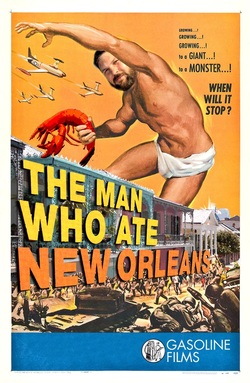
This post is about a film that was released in 2012 called The Man Who Ate New Orleans.
The film features a Presbyterian pastor in New Orleans who set out to eat at 613+ restaurants in the city, the last being a 'Last Supper' event.
I can't help but feel that calling this event the 'Last Supper' is disrespectful at best, even borders on being outright sacrilegious.
I really couldn't it believe when I saw the poster for the film - that a Pastor wouldn't be ashamed of having himself portrayed nearly naked, and wearing something that looks like a 'diaper'.
Originally, Pastor Cannata set out to eat at 613 restaurants in total, but later chose to increase it to 700 (maybe that was a more 'Christian' number than 613 - they wouldn't want people to know what this is really about!).
While I do commend the pastor's efforts to help revitalize a small PCA Church in the city of New Orleans, it just seems like another 'Whatever It Takes' type of method becoming so prevalent in the church today.
This 'Whatever It Takes' attitude, heavily promoted by Rick Warren, is obviously very dangerous as it leads to very un-Christian and un-Biblical methods, such as this one.
In these quotes from the article below, you can see an emphasis on many of the key-words used by the Emergent Church and Church Growth Movements:
" A story of celebration and community..."
"Just as the church ought to, it centers around the table." (I thought it centered around Jesus Christ and God's Holy Word.)
"Our mission is the whole kingdom I want to see our church grow, but it’s also important to see the city thrive."
"Advancing the whole kingdom by celebrating the beauty of New Orleans.
"...Relationships, nurturing, and community.
The article below is from 'byFaith', the web magazine of the Presbyterian Church in America (PCA)
The Man Who Ate New Orleans tells the story of a man who sets out to accomplish something no one in the 400-year history of New Orleans has ever done – eat a meal at every single restaurant in the city, all the while keeping a running diary with reviews and grades for each eatery.
His name is Ray Cannata, and he’s a Presbyterian minister who moves to New Orleans shortly after Hurricane Katrina to help revitalize a tiny church there. At his first service after the storm with 17 people present, he boldly challenges them to build a church around rebuilding the city.
It’s a story of celebration and community, as played out in New Orleans through music, through food, and through rebuilding.
For Cannata, learning about New Orleans culture began with learning about its food. "Everything in New Orleans revolves around food," he says. "Just as the church ought to, it centers around the table." What began as Cannata’s haphazard trial of various restaurants while leading reconstruction teams to different areas of the city became a deliberate endeavor to eat at every non-chain restaurant in New Orleans. By the end of the summer, he counted 600 down and 13 to go. Cannata will culminate his food quest at a "Last Supper" event where chefs, musicians, and artists from around the city will gather at the 613th and final restaurant to celebrate the food and culture of New Orleans.
"Our mission is the whole kingdom," explains Cannata. "I want to see our church grow, but it’s also important to see the city thrive." So, the church invests in the city whether it sees direct results or not. "It’s okay if people fall in love with Christ’s body before they fall in love with Christ Himself," says Cannata. "Gradually, they will want to love what their friends love; they will explore what we believe and embrace Christ."
Cannata believes his restaurant tour fits this mission of advancing the whole kingdom by celebrating the beauty of New Orleans. A documentary titled The Man Who Ate New Orleans (www.TheManWhoAteNewOrleans.com) is in the works for a 2011 release. It will share Cannata’s experiences with the rest of America. He hopes that by vicariously joining his restaurant quest, America will appreciate the deeper significance of relationships, nurturing, and community embedded in New Orleans’ rich food culture. "America can learn from New Orleans," he says. "America needs New Orleans."
'The PCA Pastor Who Ate New Orleans' Susan Fikse, October 2010
 RSS Feed
RSS Feed
